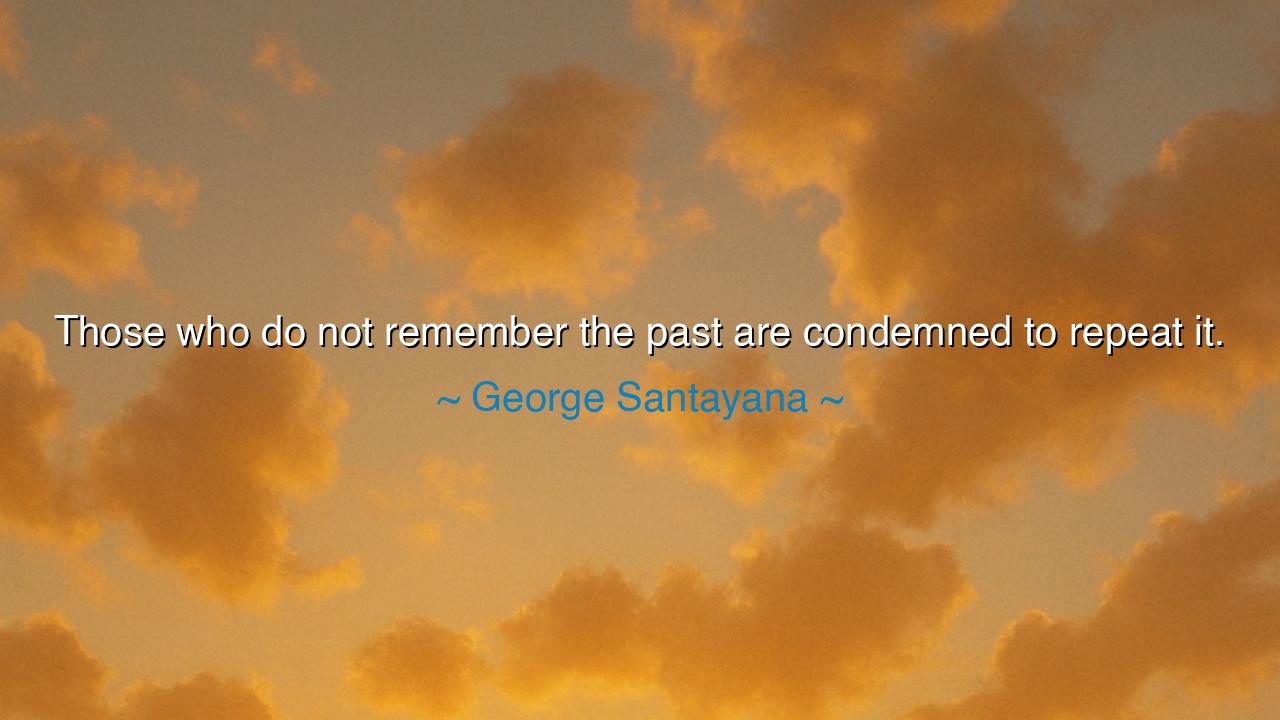
Those who do not remember the past are condemned to repeat it.






"Those who do not remember the past are condemned to repeat it." – George Santayana
So spoke George Santayana, the philosopher-poet whose words stand as a lantern across the corridors of time. When he declared, “Those who do not remember the past are condemned to repeat it,” he did not merely speak of kings and nations — he spoke of the eternal rhythm of human folly. He warned that forgetfulness is not innocence, but blindness, and that every age which refuses to heed the wisdom of its ancestors will stumble again into the same abyss. His words are not cold philosophy; they are a lament, a prophecy, and a plea to the generations that follow to learn before they suffer.
The origin of this truth lies in Santayana’s work The Life of Reason (1905), where he reflected on civilization as a cycle of learning and forgetting. He had seen how progress often deceives humanity — how each new age believes itself wiser, freer, and more enlightened than the last, while still driven by the same greed, pride, and ignorance that toppled empires before it. His warning was born in an age when the world was marching toward the fires of the twentieth century — when industrial power grew faster than moral wisdom, and when nations, forgetting the lessons of history, were preparing to repeat its tragedies on a scale unseen.
The most terrible fulfillment of his prophecy came soon after his death, in the blood and ashes of the Second World War. Barely two decades after the “war to end all wars,” humanity once again unleashed destruction upon itself. The world had forgotten the suffering of the trenches, the hunger of millions, the futility of conquest — and so it returned to them. Adolf Hitler rose by exploiting the same forces that had ignited wars since the dawn of time: fear, division, and wounded pride. The Holocaust, the devastation of cities, the ruin of nations — all bore witness to Santayana’s truth: that when memory fades, evil finds its voice again.
Yet this lesson is not confined to nations. It applies to every human heart. Each person carries within them a private history — moments of failure, regret, and awakening. Those who do not remember their own mistakes are likewise condemned to walk in circles, repeating the same errors in new disguises. The same anger returns in different arguments, the same fears wear new faces, the same wounds open where wisdom was not allowed to grow. To remember is not to dwell on pain, but to transform it into strength — to make one’s past a teacher rather than a tormentor.
The ancients understood this well. The Greeks taught through myth that forgetfulness was the enemy of wisdom. The river Lethe, in their underworld, caused souls to forget their earthly lives, dooming them to repeat their errors in the next. Memory, Mnemosyne, was sacred — the mother of all the Muses, for without memory, there can be no art, no learning, no growth. Santayana’s words echo that same ancient truth: that civilization survives not through power or wealth, but through remembrance — through the careful preservation of its moral lessons.
History, then, is not a mere record of what has been; it is a mirror and a compass. When we look into it with humility, we see both the paths that led to ruin and those that led to renewal. But when we ignore it, the same patterns of arrogance and cruelty emerge anew. The fall of Rome, the wars of religion, the corruption of power — all are warnings carved in the stone of time. The wise study them not as distant tales, but as reflections of their own age, for human nature changes far less than we imagine.
So, my child of the future, take heed of Santayana’s wisdom: remember deeply. Remember not only the victories, but the mistakes; not only the heroes, but the warnings. Read history not as a scholar, but as a guardian — for the past is the teacher of all who wish to build a nobler world. And remember your own story, too. Each pain you have endured, each failure you have survived, is a fragment of your own early warning system. To remember is to awaken; to forget is to fall asleep in the shadow of your own undoing.
For those who remember, there is hope. For those who forget, there is repetition. Let memory be your shield, and reflection your guide, and you will not be condemned to walk again the long and weary road of forgotten mistakes. Instead, you will carry the light of history — the torch of remembrance — and with it, illuminate a wiser path for all who follow.






AAdministratorAdministrator
Welcome, honored guests. Please leave a comment, we will respond soon